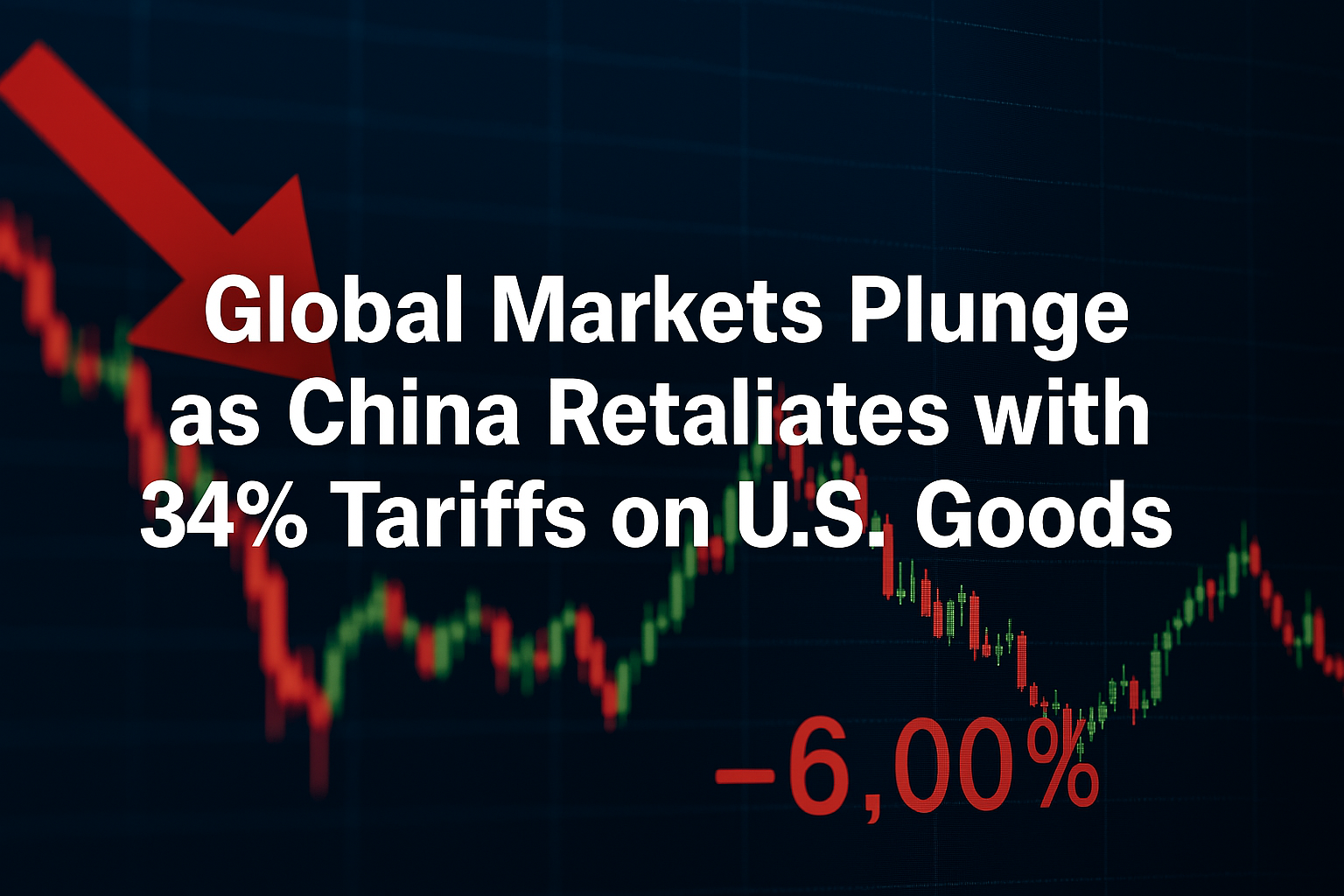Trade War Escalation Sparks Global Market Selloff
Financial markets worldwide took a sharp dive on April 4, 2025, as China responded to U.S. trade measures with a sweeping 34% tariff on American goods. The move triggered panic among investors, leading to significant losses in major stock indices. The Dow Jones Industrial Average tumbled by 1,400 points (4%), the S&P 500 declined by 4.8%, and the Nasdaq Composite plunged by 6%—its worst single-day performance in over a year. The selloff extended to European and Asian markets, reflecting concerns over escalating trade tensions and their broader economic implications.
Why This Matters for Investors
The intensifying trade war between the world’s two largest economies is shaking investor confidence. China’s latest retaliatory tariffs primarily target key American industries, including agriculture, automotive, and technology, raising fears of prolonged economic disruption. The uncertainty surrounding global supply chains, corporate earnings, and economic growth has led investors to reassess risk exposure, resulting in a rush to safe-haven assets like gold and U.S. Treasury bonds.
Sectors Hit the Hardest
Technology Stocks Face Sharp Declines
The Nasdaq’s 6% drop was largely driven by losses in major tech firms, which have significant exposure to the Chinese market. Apple (AAPL) slid 5.7%, Nvidia (NVDA) fell 6.2%, and Tesla (TSLA) dipped 5.3%. Analysts warn that further restrictions on semiconductor and software exports could deepen these declines.
Industrial and Automotive Sectors Under Pressure
U.S. automakers with a substantial presence in China, such as Ford (F) and General Motors (GM), saw their stocks decline by 5.1% and 4.9%, respectively. Meanwhile, Boeing (BA), which relies heavily on Chinese sales, dropped 7%, exacerbating concerns over weakened global demand.
Commodities and Energy Markets React
Oil prices slipped as investors anticipated a slowdown in global economic activity. Brent crude fell 3.5% to $78 per barrel, while West Texas Intermediate (WTI) dropped 3.8% to $74 per barrel. Gold, often considered a safe-haven asset, surged 2.4% as traders sought stability amid uncertainty.
Market Analysts Weigh In
- Mohamed El-Erian, Chief Economic Advisor at Allianz: “The market is grappling with uncertainty. If the U.S. and China fail to negotiate a resolution soon, we could see a prolonged period of heightened volatility.”
- Goldman Sachs Report (April 2025): “The trade war could shave 0.5% off U.S. GDP growth this year, with the technology and industrial sectors feeling the brunt.”
- Ray Dalio, Founder of Bridgewater Associates: “Investors should prepare for persistent instability in global markets. Diversification and alternative assets may provide some cushion.”
Investor Strategy: How to Navigate Market Volatility
With trade tensions escalating, investors should consider the following strategies:
- Diversify Across Asset Classes: A mix of equities, bonds, commodities, and alternative investments can reduce portfolio risk.
- Increase Exposure to Safe-Haven Assets: Gold, U.S. Treasuries, and defensive stocks (such as utilities and consumer staples) tend to perform well during market uncertainty.
- Focus on Quality Stocks: Companies with strong balance sheets, minimal reliance on global supply chains, and consistent cash flow generation are better positioned to weather market downturns.
- Monitor Trade Developments Closely: Investors should stay informed about upcoming trade negotiations, tariff changes, and geopolitical developments that could impact markets.
The Road to Resolution?
While no immediate resolution appears in sight, diplomatic talks between U.S. and Chinese officials remain ongoing. The White House has signaled that negotiations could resume within weeks, with hopes of de-escalating tensions. However, if the trade war drags on, prolonged market volatility and economic slowdowns could become a reality for the rest of 2025.
For real-time updates and in-depth market analysis, stay tuned to MoneyNews.Today—your trusted source for daily investor insights.





